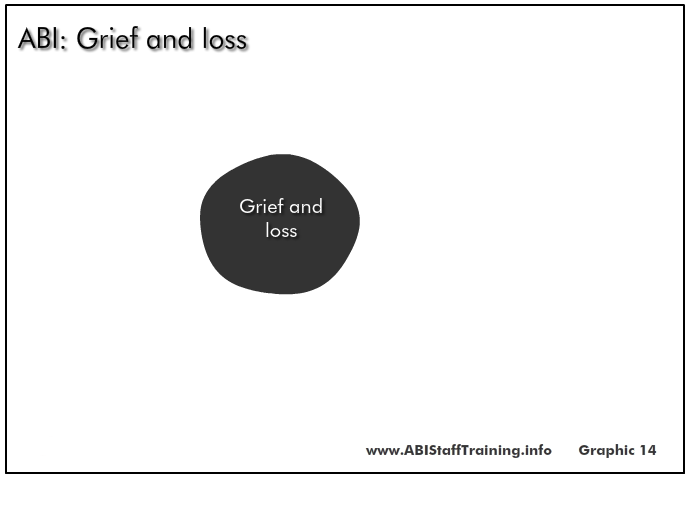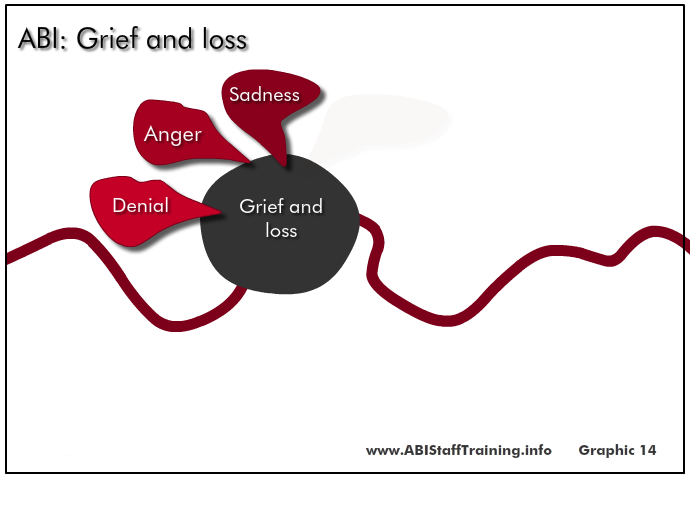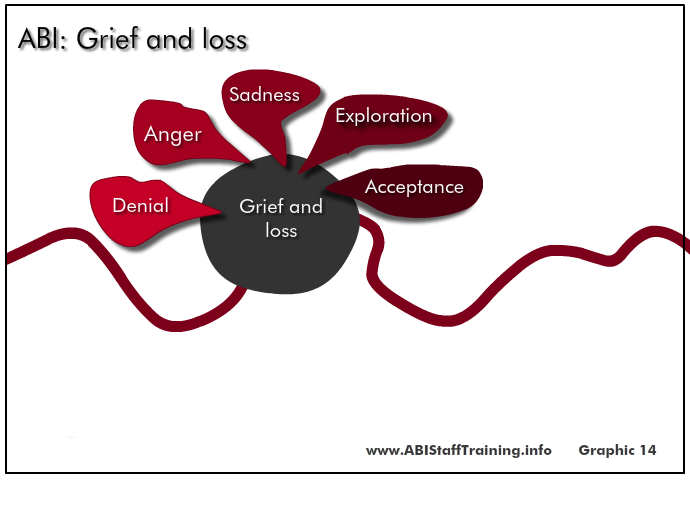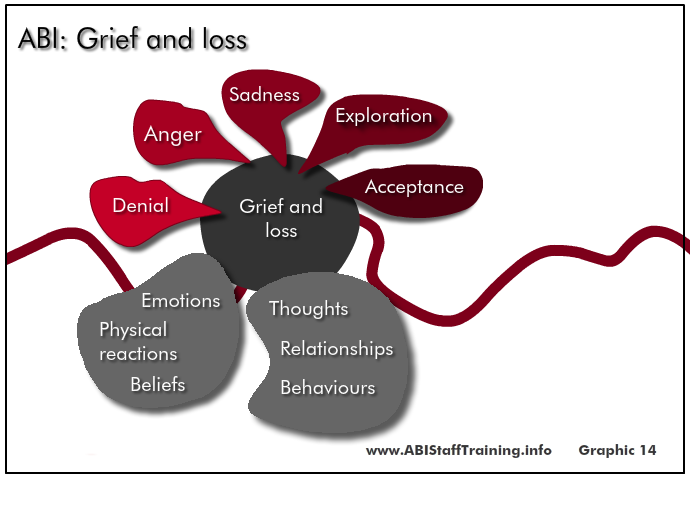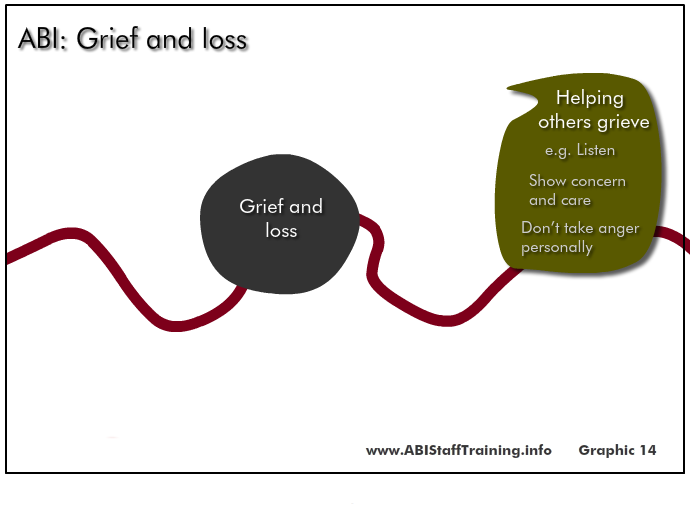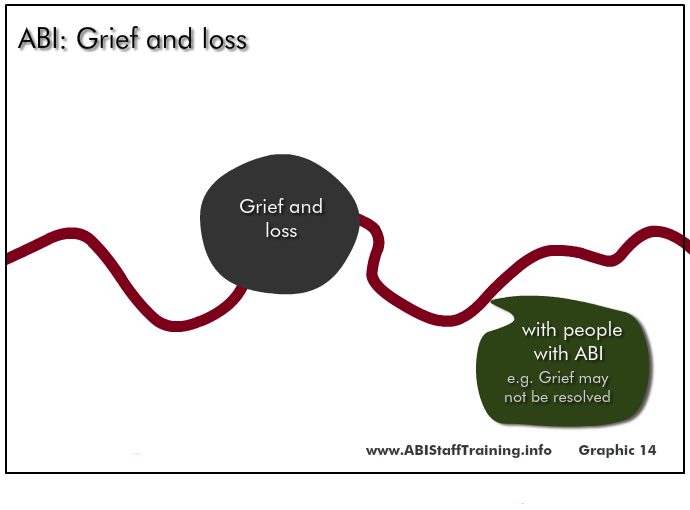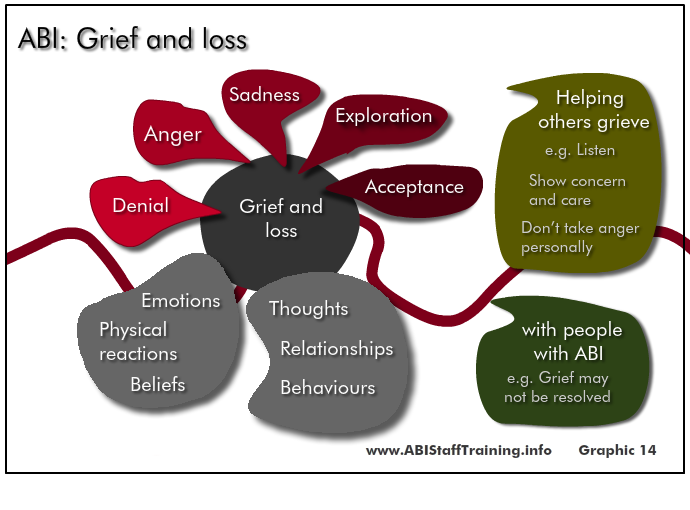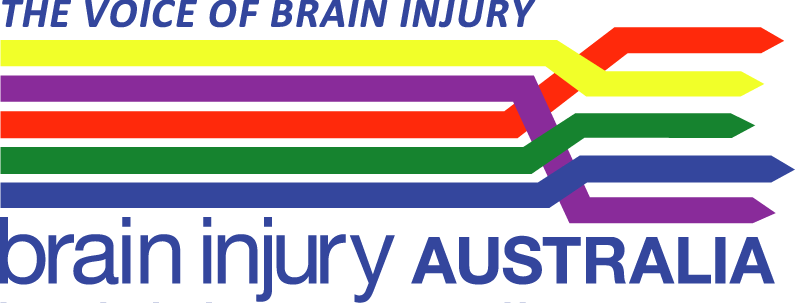- MODULE 2: Working with ABI
- Introduction
- Take the Pre-test
- A. Uniquely building independence
- a) Unique
- b) Injury-Effect-Behaviour
- c) Frontal lobe proxy
- d) Change happens
in the day to day - e) A life span view
- f) Person centred, Goal directed
- B. Through emotions and relationships
- g) Person with ABI
- h) Family members
- i) Grief and loss
- j) Support workers
- k) Managers and Team leaders
- l) Case managers
- m) Professional boundaries
- C. With services
- n) Pathways
- o) Part of a team
- p) The services network
- D. Principles and standards
- q) Principles and standards
- E. Integration
- r) Practice tools
- s) Case study
- t) Further learning
- Take the Post-test
i) Grief and loss
i) Loss and grief
Grief is how we respond when we experience loss. Grief is a normal, natural and inevitable response to loss and it can affect every part of our lives.
Grief can seem like a roller-coaster ride with ups and downs, or it may feel like we are being battered about like a little boat in a storm. Sometimes it can seem overwhelming and frightening. Grief allows us to gradually adjust to our loss and find a way of going on with our life.
Everyone experiences grief in their own way. There is no 'correct' way to grieve, and no way to 'fix it'.
Feelings – We may experience intense feelings such as shock, chaos, sadness, anger, anxiety, disbelief, panic, relief, or even numbness.
Thoughts – We may experience confusion and find it difficult to concentrate.
Physical reactions – Sometimes we may have trouble sleeping. Grief can also lead to physical symptoms such as tiredness, loss of appetite, nausea or pain.
Relationships – Relationships can be affected. Sometimes we will be preoccupied or tense, or feel
disinterested in other people and things.
Behaviours – We may experience lethargy or over activity, pay little attention to self care, sleep a lot, desire to resort to alcohol or non-prescribed drugs and other potentially harmful behaviours.
Beliefs – Our beliefs about life may be challenged. Often grieving people wonder why this has happened to them.
Helping others
No one can take away the pain and sadness of grief, but knowing that people care is comforting and healing for grieving people. You cannot fix it, but you can help.
Here are some suggestions for things that might help:
• keep in touch and be prepared to just listen
• be open in showing your concern and care
Sometimes people with ABI are not able to resolve their grief.
Ideas above based on Understanding Grief Palliative Care Australia
Rules of thumb
1. Understand the emotional process of grieving
2. Be prepared to listen and show care and concern
3. Recognise the possibility that grief may not be resolved or be able to be resolved.
Jonathan's mother talking about emotional impact and writing Paper Cranes:
I started writing Paper Cranes – I didn't call it Paper Cranes, the publisher did because they picked up on this theme of hope that we refused to let of as a family, but and also because of his school made him a thousand paper cranes.
I started keeping a journal in hospital, that's how it all began and I began making daily entries of the microscopic improvements he was making as I knew I was too emotionally damaged to be able to recall all the terribly important things that happened or that doctors said and the medication that he reacted to. . .
It became important because as the weeks turned into months it gave me something to look back on to see how far he had come and it was, and for you too wasn't it, we would get it out and say gee look at that, you know, six weeks ago he couldn't move his toe. And now he is moving his big toe.
So that's how we were driven. We were driven by that.
And then we brought him home I kept the journal going and then as he returned to school one morning a week over a very slow period of time.
I kept writing because I couldn't go very far from home, and I ah, it just turned itself into a manuscript. It has gone on to offer hope and inspiration to other families that find themselves in a similar situation.
And what it did for me was remarkable in itself. It was cathartic. I didn't think it was at the time because I cried bucket loads of tears at having to revisit all those painful memories and feelings that I thought I had dealt with and filed away. But when I reached the final chapter there was a very calm and I felt a very strange calmness and an inner peace that I hadn't felt for several years. It was like my frantic mind with its unrelenting quest for solutions and answers and how are we getting better. I found the answer was there all along and that it was inside of me, and it was this special place of understanding that I reached.
And of course writing it let me stand back and reflect on the enormity of what we had been through as a family. It taught me to let go of the past and ah accept him for everything that he was now, this new Jonathan and the amazing person that he was now, that's what it did for me. So it made me realise that life may not have fulfilled all our hopes and dreams but you know it doesn't have to, sometimes the dreams change but they can still be good.
ii) Summary: Graphic
SLIDES:
To pause: Hover mouse over slide. To continue: move mouse off slide.
To go to a specific slide: Click on slide numbers below.
iii) Questions
Answer the following questions:
Grief is how we respond when we experience loss. Grief is a normal, natural and inevitable response to loss and it can affect every part of our lives.
What are five examples of the kinds of experiences a grieving person may have.
Feelings – The person may experience intense feelings such as shock, chaos, sadness, anger, anxiety, disbelief, panic, relief, or even numbness.
Thoughts – The person may experience confusion and find it difficult to concentrate.
Physical reactions – Sometimes the person may have trouble sleeping. Grief can also lead to physical symptoms such as tiredness, loss of appetite, nausea or pain.
Relationships – Relationships can be affected. Sometimes the person will be will be preoccupied or tense, or feel disinterested in other people and things.
Behaviours – The person may experience lethargy or over activity, pay little attention to self care, sleep a lot, desire to resort to alcohol or non-prescribed drugs and other potentially harmful behaviours.
Beliefs – Our beliefs about life may be challenged. The person may wonder why this has happened to them.
